WHEELS of INDUSTRY
Page 34
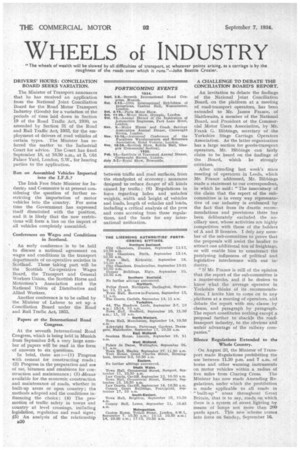
Page 35
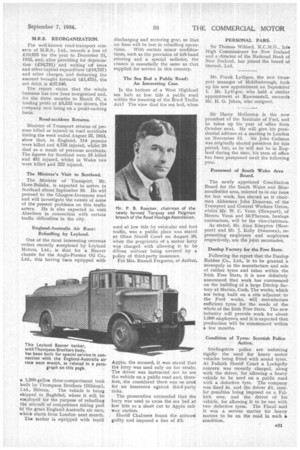
Page 36
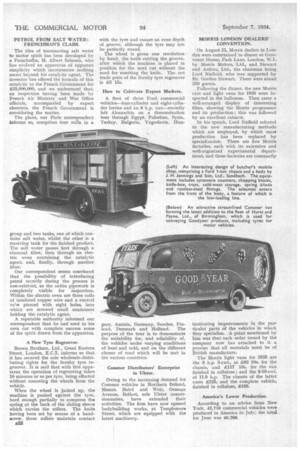
Page 37
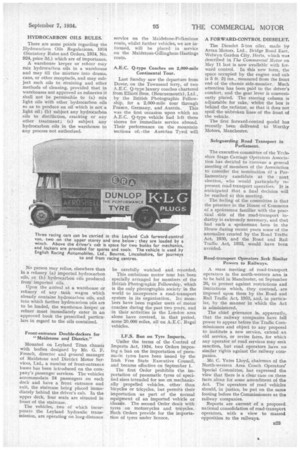
Page 38
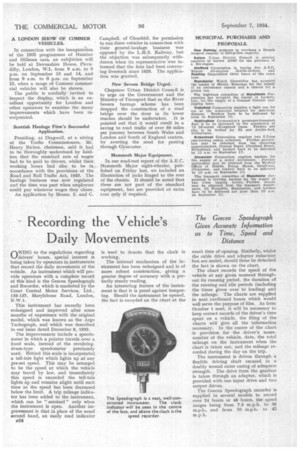
If you've noticed an error in this article please click here to report it so we can fix it.
DRIVERS' HOURS: CONCILIATION BOARD SEEKS VARIATION.
The Minister of Transport announces that he has received an application from the National Joint Conciliation Board for the Road Motor Transport Industry (Goods) for a variation of the periods of time laid down in Section 19 of the Road Traffic Act, 1930, as amended by Section 31 of the Road and Rail Traffic Act, 1933, for the employment of drivers of road vehicles of certain types. The Minister has referred the matter to the Industrial Court for advice. The Court has fixed September LS, at 10.30 a.m., at 5, Old Palace Yard, London; S.W., for hearing parties to the application.
Ban on Assembled Vehicles Imported into the I.F.S.?
The Irish Free State Minister for Industry and Commerce is at present considering the question of further restricting the importation of motor vehicles into the country. For some time the Government has expressed itself dissatisfied with the position, and it is likely that the new restrictions will form a ban on the import of all vehicles completely assembled.
Conferences on Wages and Conditions in Scotland.
An early conference is to be held to discuss a national agreement on wages and conditions in the transport departments of co-operative societies in Scotland. Those taking part will be the Scottish Co-operative Wages Board, the Transport and General Workers Union, the Scottish Horse and Motormen's Association and the National Union of Distributive and Allied Workers. • Another conference is to be called by the Minister of Labour to set up a Conciliation Board under the Road and Rail Traffic Act, 1933.
Papers at the International Road Congress.
At the seventh International Road Congress, which is being held in Munich from September 3-8, a very large number of papers will be read in the form of answers to six questions.
In brief, these are :—(1) Progress with cement for constructing roads; (2) Progress in the preparation and use of tar, bitumen and emulsions for construction and maintenance ; (3) ..Means available for the economic construction and maintenance of roads, whether in built-up areas or open country ; the methods adopted and the conditions influencing the choice ; (4) The promotion of traffic safety in towns and country at level crossings, including legislation, regulation and road signs ; ,(5) An analysis of the relationship 1320
between traffic and road surfaces, from the standpoint of economy;. measures designed to reduce danger of all kinds caused by traffic; (0) Regulations in force .regarding laden and unladen weights,' width and height of vehicles and loads, length of vehicles and loads, including a critical analysis of the pros and cons accruing from these regulations, and the basis for any international unification.
A CHALLENGE TO DEBATE THE CONCILIATION BOARD'S REPORT.
An invitation to debate the findings of the National Joint Conciliation Board, on the platform at a meeting of road-transport operators, has been extended to Mr. James France, of Slaithwaite, a member of the National Board, and President of the .Commercial Motor Users Association, by Mr. Frank G. Bibbings, secretary of the Yorkshire Stage Carriage Operators Association. As the latter organization has a large section for goods-transport operators, Mr. Bilabings can fairly claim to he heard on the findings of the Board, which be strongly criticizes. .
After attending last week's mass meeting of operators in Leeds, which Mr. France addressed, Mr. Bibbings made a statement to our correspondent, in which he said: "The inaccuracy of the claim that the report of the subcommittee is in every way representative of our industry is evidenced by the fact that from its drastic recommendations and provisions there has been deliberately excluded the ancillary user, whose activities are highly competitive with those of the holders of A and B licences. I defy any member of the sub-committee to prove that the proposals will assist the haulier to attract one additional ton of freightage, or will enable him to counteract the paralysing influences. of political and legislative interference with our industry.
" If Mr. France is still of the opinion that the report of the sub-committee is a -master-stroke, and, if he desires to know what the average operator in Yorkshire thinks of its . recommendations, I invite him to come on to any platform at a meeting of operators, and debate the report with me,clause by clause, and paragraph by paragraph. The report constitutes nothing except .a proposal further to shackle the roadtransport industry, to the obvious and unfair advantage of the railway companies."
Silence Regulations Extended to the Whole Country.
On August 23, the Minister of Transport made Regulations prohibiting the use between 11.30 p.m. and 7 a.m. of horns and other warning instruments on motor vehicles within a radius of five miles from Charing Cross. The Minister has now made Amending Regulations, under which the prohibition is made applicable to all roads in " built-up " areas throughout Great Britain, that is to say, roads on which there is a system of street lighting by means of lamps not more than 200 yards apart. This new scheme comes into force on Sunday, September 16. M.R.S. REORGANIZATION.
The well-known road-transport concern of M.R.S., Ltd., records a loss of £10,925 for the year to December 81,. 1033, and, after providing for depreciation (R16,781) and writing off issue and other capital expenditure (£10,797) and other charges, and deducting the amount brought forward (£1,475), the net debit is £37,846.
The report states that the whole business has now been reorganized and, for the three months to March 31. a trading profit of £6,533 was shown, tho company now being on a profit-earning basis.
Road-accident Returns.
Ministry of Transport returns of persons killed or injured in road accidents during the week ended August 25, 1934,• show that, in England, 114 persons were killed and 4,756 injured, whilst 20 died as. a result of previous accidents.• The figures for Scotland were 18 killed and 481 injured, whilst in Wales two
were killed and 222 injured. •
The Minister's Visit to Scotland.
The Minister of Transport, Mr. Hore-Belisha, is expected to arrive in Scotland about September 26. He will proceed to the Glasgow-Inverness road and will investigate the causes of some of the present problems on this traffic artery. He is also expected to visit Aberdeen in connection with certain traffic difficulties in the city.
England-Australia Air Race: Refuelling by Leyland.
One of the most interesting overseas orders recently completed by Leyland Motors, Ltd., ie that for a Beaver chassis for the Anglo-Persian Oil Co., Ltd., this having been equipped with
a. 1,200-gallou, three-compartment tank built by Thompson Brothers (Easton),
Ltd., Bilston. The vehicle is being shipped to Baghdad, where it will be employed for the purpose of refuelling the aircraft of competitors taking part in The great England-Australia air race, whielt starts from London next month.
The tanker is equipped with rapid discharging and metering gear, so that no time will be lost in refuelling operations. With certain minor modifications, such as the provision of left-hand steering and a spdcial radiator, the chassis is essentially the same as that supplied for service in this country.
The Sea Bed a Public Road: An Interesting Case.
Is the bottom of, a West Highland sea loch at low tide a public road within the meaning Of the Road Traffic Act? The view that the sea bed, when used at low tide by vehicular and foot traffic, was a public place was stated at Oban Sheriff Court on August 30, when the proprietrix of a motor lorry was charged with allowing it to be driven without being covered by a policy of third-party insurance. For Mrs. Russell Ferguson, of Ardtur, Appin, the accused, it was stated that the lorry was used only on her estale. The driver was instructed not to use the vehicle on a public road and, therefore, she considered there was no need for an insurance against third -party risks.
The prosecution contended that the lorry was used to cross the sea bed at low tide as a short cut to Appin railway station.
Sheriff Chalmers fauna the accused guilty and imposed a fine of £5. PERSONAL PARS.
, Sir Thomas Wilford, K.C.M.G., late High Commissioner for. New Zealand and a director of the National Bank of New Zealand, has joined the board of Sternol, Ltd.
Mr. Frank Lythgoe, the new transport manager of Middlesbrough, took up his new appointment on September 1. Mr. Lythgoe, who held a similar appointment at Rawtenstall, succeeds Mr. H. G. Jeken, who resigned.
Sir Harry McGowan is the new president of the Institute of Fuel, and he takes up his year of roffice from October next. He will give his presidential address at a meeting in London on November 12. Sir John Cadman was originally elected president for this period, but, as he will not be in England during the time, his term of office has been postponed until the following year.
The newly appointed Conciliation Board for the South Wales and Monmouthshire area, referred to in our issue for last week, has elected as it chairman Alderman John Donovan, of the Transport and General Workers Union, whilst Mr. W. C. Venn (Newport), of Messrs. Venn and McPherson, haulage contractors, will be the vice-chairman.
As stated, Mr. Alan Kimpton (Newport) and Mr. J. Kelly (Swansea), representing employers and employees respectively, are the joint secretaries.
Dunlop Factory for the Free State.
Following the report that the Dunlop Rubber Co., Ltd., is to be granted a monopoly in the manufacture and sale of rubber tyres and tubes within the Irish Free State, it is now definitely announced that work has commenced on the building of a large Dunlop factory at Marina, Cork. The works, which are being built on a site adjacent to the Ford works, will manufacture sufficient tyres for the needs of the whole of the Irish Free State. The new industry will provide work for about 1,000 employees, and it is expected that production will be commenced within a few months.
Stirlingshire police are enforcing rigidly the need for heavy motor vehicles being fitted with sound tyres. At Falkirk Sheriff Court a Lochgclly concern was recently charged, along with the driver, for allowing a heavy vehicle to be used on a public road with a defective tyre. The company was fined 5s. and the driver £1, similar penalties being imposed on a Falkirk user, and the driver of his vehicle, for allowing it to be run with two defective tyres. The Fiscal said it was a serious matter for heavy motors to be on the road in such a condition.
PETROL FROM SALT WATER: FRENCHMAN'S CLAIM.
The idea of transmuting salt water to motor spirit has been developed by a Frenthnibm, M. Albert Saheurs, who has evolved an apparatus of apparent simplicity which incorporates nothing secret beyond his catalytic agent. The inventor has offered the formula of this catalytic to the French Government for 25,000,000, and we understand that, an inspection having been made by French Air Ministry and War Office officials, accompanied by expert chemists, the French Government is considering the matter.
The plant, our Paris correspondent informs us, comprises four stills in a
group and two tanks, one of which contains salt water, whilst the other is a receiving tank for the finished product. The salt water passes first through a charcoal filter, then through an electric oven containing the catalytic agent, and, finally, through another filter.
Our correspondent seems convinced that the possibility of introducing petrol secretly during the process is non-existeht, as the entire pipework is completely visible for inspection. Within the electric oven are three coils of insulated copper wire and a central tube pierced with eight holes, into which are screwed small containers holding the catalytic agent.
A reputable authority informed our correspondent that he had used in his own car with complete success some of the spirit drawn from the apparatus.
A New Tyre Regroover.
Brown Brothers, Ltd., Great Eastern Street, London, E.C.2, informs us that it has secured the sole wholesale-distributing rights for the Scruby tyre regroover. It is said that with this apparatus the operation of regrooving takes 10 minutes or so per tyre, being effected without removing the wheels from the vehicle.
When the wheel is jacked up, the machine is pushed against the tyre, hard enough partially to compress the spring at the back of the sliding sleeve which carries the rollers. The knife having been set by means of a hand. screw, these rollers maintain contact B22 with the tyre and ensure an even depth of groove, although the tyre may not be perfectly round.
The wheel is given one revolution by hand, the knife cutting the groove, after which the machine is placed in position for the next cut without the need for resetting the knife. The net trade price of the Scruby tyre regroover is £5 15s.
A fleet of three Ford commercial vehicles—four-cylinder and eight-cylinder tarries and an 8 h.p. van—recently left Alexandria on a demonstration tour through Egypt, Palestine, Syria, Turkey, Bulgaria, Yugoslavia, Hun gary, Austria, Germany, Sweden, Finland, Denmark and Holland. The purpose of the tour is to demonstrate the suitability for, and reliability of, the vehicles under varying conditions of heat and cold, and on the different classes of road which will he met in the various countries.
Conuner Distributors' Enterprise in Ulster.
Owing to the increasing demand for Commer vehicles in Northern Ireland, Messrs. Baird and Weir, Ormeau Avenue, Belfast, sole Ulster colletssionnaires, have extended their activities. The firm have now opened bodybuilding works, at Templemons Street, which are equipped with the latest machinery.
MORRIS LONDON DEALERS' CONVENTION.
OnAugust 31, Morris dealers in London were entertained to dinner at Grosvenor House, Park Lane, London, W-1, by Morris Motors, Ltd., and Stewart and Ardern, Ltd., the chairman being Lord Nuffield, who was supported by Mr. Gordon Stewart There were about 350 guests.
Following the dinner, the new Morris cars and light vans for 1935 were inspected in the ballroom. Then came a well-arranged display of interesting films, showing the Morris programme and its production; this was followed by an excellent cabaret.
In his speech, Lard Nuffield referred to the new manufacturing methods which are employed, by which mass production has been replaced by specialization. There are five Morris factories, each with its extensive and well-organized experimental department, and these factories are constantly
instituting improvements in the particular parts of the vehicles in which they specialize. A point mentioned by him was that each order issued by the company now has attached to it a proviso that all materials must be of British manufacture.
The Morris light vans for 1935 are the 8 h.p. 5-cwt., at £92 10s. for the chassis, and 117 10s. for the van finished in cellulose ; and the 8-19-cwt. of 11.9 h.p. The chassis of the latter costs £125, and the complete vehicle, finished in cellulose, a6S.
America's Lower Production.
According to an advice from New York, 42,710 commercial vehicles were produced in America in July; the total for June was 46,200.
HYDROCARBON OILS RULES.
There are some points regarding the Hydrocarbon Oils Regulations, 1934 (Statutory Rules and Orders, 1934, No. 924, price 3d.) which are of importance.
A warehouse keeper or refiner may mix hydrocarbon oils in a warehouse and may fill the mixture into drums, cans, or other receptacle, and may subject such oils to straining and other methods of cleaning, provided that in warehouses not approved as refineries it shall not be permissible to (a) mix light oils with other hydrocarbon oils so as to produce an oil which is not a light oil; (b) subject any hydrocarbon oils to distillation, cracking or any other treatment; (c) subject any hydrocarbon oils in the warehouse to any process not authorized.
No person may refine, elsewhere than in a refinery (a) imported hydrocarbon oils, or (b) hydrocarbon oils produced from imported oils. •
Upon the arrival at a warehouse or refinery of any . tank wagon which already contains hydrocarbon oils, and into which further hydrocarbon oils are to be loaded, the warehouse keeper or refiner must immediately enter in an approved book the prescribed particulars in regard to the oils contained.
Front-entrance Double-deckers for "Maidstone and District."
Mounted on Leyland Titan chassis with bodies designed by Mr. G. F. French, director and general manager of Maidstone and District Motor Services, Ltd., a number of front-entrance buses has been introduced on the company's passenger services. The vehicles accommodate 24 passengers on each deck and have a front entrance and exit, the staircase being placed immediately behind the driver's cab. In the upper deck, four seats are situated in front of the staircase.
The vehicles, two of which incorporate the Leyland hydraulic transmission, are operating on long-distance
service on the Maidstone-Folkestone routes whilst further vehicles, we are informed, will be placed in service on the Maidstone-Gillingham-Hastings route.
A.E.C. Q-type Coaches on 2,000-mile Continental Tour.
Last Sunday saw the departure from Dover, on the Townsend terry, of two A.E.C. Q-type luxury coaches chartered from Elliott Bros. (Bournemouth), Ltd., by the British Photographic Fellowship, for a 2,000-mile tour through France, Germany, and Austria. This was the first occasion upon which an A.E.C. Q-type vehicle had left these shores for immediate service abroad. Their performance on the mountain sections oft 'the Austrian Tyrol will be carefully watched and recorded.
This ambitious motor tour has been specially arranged for members of the British Photographic Fellowship, which is the only photographic society in the world to incorporate a road-transport system in its organization. Its members have been regular users of motor coaches during the past two years, and in their activities in the London area alone have covered, in that period, some 20,000 miles, all on A.E.C. Regal vehicles.
LF.S. Ban on Tyre Imports.
Under the terms of the Control of Imports Act, 1934, two Orders imposing a ban on the importation of pneumatic tyres have been issued by the Irish Free State Executive Council, and became effective on September I.
The first Order prohibits the importation of pneumatic tyres of specified sizes intended for use on mechanically propelled vehicles, other than bicycles or tricycles, but permits their importation as part of the normal equipment of an imported vehicle or chassis. The second Order deals with tyres on motorcycles and tricycles. Both Orders provide for the importation of tyres under licence. A FORWARD-CONTROL DIESELET, The Dieselet 3-ton oiler, made by Arran Motors, Ltd., Bridge Road East, Wehvyn Garden City, Herts, which was described in The Commercial Motor on May 11 last is now available with forward control. In this new form, the space occupied by the engine and cab is 5 ft. 2-i ins., measured from the front end of the chassis side-member. Much attention has been paid to the driver's comfort, and the gear lever is conveniently placed. The steering column is adjustable for rake, whilst the box is behind the radiator, so that it does not spoil the unbroken lines of the front of the vehicle.
The first forward-control model has recently been delivered to Worthy Motors, Manchester.
Safeguarding Road Transport in • The executive committee of the Ycrkshire Stage Carriage Operators Association has decided to convene a general meeting of members of the Association to consider the nomination of a Parliamentary candidate at the next election, who would particularly represent road-transport operators. It is anticipated that a final decision will be reached at this meeting. The feeling of the committee is that the presence in the House of Commons of a spokesman familiar with the practical side of the road-transport industry is extremely necessary, and that had such a spokesman been in the House during recent years some of the anomalies created by the Road Traffic Act, 1930, and the Road and Rail Traffic Act, 1933, would have been avoided.
Road-transport Operators Seek Similar Powers to Railways.
A mass meeting of road-transport operators in the north-western area is to be held in Manchester, on September 20, to protest against restrictions and limitations which, they contend, are imposed upon them by the Road and Rail Traffic Act, 1933, and, in particular, by the manner in which the Act is administered.
The chief grievance is, apparently, that the railway companies have full power to appear before the Traffic Commissioners and object to any proposal to institute a new service, extend an old service, or revise fares, for which any operator of road services may seek sanction, but road operators have no similar rights against the railway companies.
Mr. C. Yates Lloyd, chairman of the North-western Area Coach Operators' Special Committee, has expressed the view that there is a clear case on these facts alone for some amendment of the Act. The operators of road vehicles should, in justice, be put on the same footing before the Commissioners as the railway companies.
Reports are current of a proposed national consolidation of road-transport operators, with a view to massed opposition to the railways. A LONDON SHOW OP COMMER VEHICLES.
In connection with the inauguration of the 1935 programmes of Humber and Hillman cars, an exhibition will be held at Devonshire House, Piccadilly, London, W.1, from 9 a.m. to 8 p.m. on September 13 and 14, and from 9 a.m. to 6 p.m. on September 15, when a range of Commer commercial vehicles will also be shown.
The public is cordially invited to inspect the display, which is an excellent opportunity for London and other operators to examine the many improvements which have been incorporated.
Scottish Haulage Finn's Successful Application.
Presiding, at Dingwall, at a sitting of the Traffic Commissioners, Mr. Henry Riches, chairman, said it had to be thoroughly understood by hauliers that the standard rate of wages had to be paid to drivers, whilst their, working hours had also to be inaccordance with the provisions of the Road and Rail Traffic Act, 1933. The haulage business was now regulated and the time was past when employers could pay whatever wages they chose.
An application by Messrs. S. and C.
Campbell, of Glenshiel, for permission to run three vehicles in connection with their general-haulage business was opposed by the L.M.S. Railway, butthe objection was subsequently withdrawn when its representative was informed that the firm had been conveying-livestock since 1920. The application was granted.
New Severn Bridge Urged.
Chepstow Urban District Council is to urge on the Government and the Ministry of Transport that as the River Severn barrage scheme has been dropped the construction of a road bridge over the river in its lower reaches should be undertaken. It is pointed out that it would result in a saving to road traffic of over 50 miles per journey between South Wales and London and South of England centres, by averting the need for passing through Gloucester.
Mammoth Major Equipment.
In our road-test report of the A.E.C. Mammoth Major eight-wheeler, published on Friday last, we included an illustration of jacks hinged to the rear of the chassis. It should be noted that these are not part of the standard equipment, but are provided at extra cost only if required,




























































































